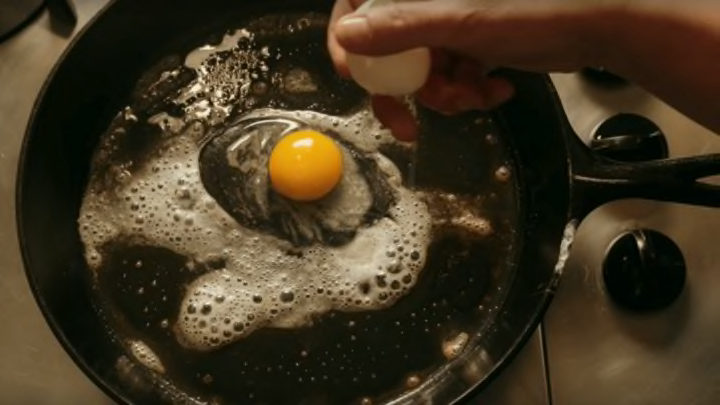Without realizing it, Paul Keye had made the American Egg Board very unhappy. A creative director at the ad agency Keye/Donna/Pearlstein, Keye (it rhymes with “high”) had been partly responsible for a public service announcement in tandem with the Partnership for a Drug-Free America. In it, actor John Roselius expertly cracked an egg into a searing hot frying pan, watched it sizzle, and proclaimed the scene a metaphor for what happens to your neurons when you use illegal narcotics.
“This is your brain,” Roselius intoned. “This is drugs. This is your brain on drugs.” Then, rhetorically: “Any questions?”
The spot premiered in 1987 and was lauded for its simple, direct, and effective approach to communicating the dangers of street drugs to teenagers. It’s been parodied, revisited, and credited with an actual decline in drug use. But spokespeople for the Egg Board complained that their protein-filled product was being unfairly connected with dangerous and addictive substances.
“Had I heard that,” Keye tells Mental Floss, “I would’ve told the guy to get a good night’s sleep.”
According to Keye, the spot was born out of the advertising world’s desire to “un-sell” something. “The ad world has a guild, the American Association of Ad Agencies,” he says. “One of the board members, Phil Joanou, went to a meeting and said, ‘I think we should put together some kind of effort [against] hard drugs.’”
Everyone at the table nodded. This was the 1980s, when Nancy Reagan’s “Just Say No” campaign was in full force and crack cocaine was becoming an epidemic. Under the volunteer ad coalition named the Partnership for a Drug-Free America, Joanou and the agencies got together and convinced television and radio stations to donate airtime to public service messages. The value of the spots was in excess of $300 million.
The problem was that no one was creating any content to fill those empty spaces. “Big ad agencies move very slowly,” Keye says. Eventually, Joanou came to Keye and asked if his firm could come up with a concept before that valuable airtime was taken away by impatient station operators.
Keye agreed. At the time, the drug being targeted by the Partnership was cocaine. “It was the new, 'wonderful,' no-problem drug,” Keye says. “All up, no down. We knew we didn’t want to feature addicts, but put it out there for young adults and teenagers. The message was, there could be irreversible damage.”
At Keye/Donna/Pearlstein, copywriter Larre Johnson and art director Scot Fletcher came up with the fried egg scenario; Keye got an agreement from director Joe Pytka (who later directed the 1996 Michael Jordan movie Space Jam) to film it at no cost. Actor John Roselius was paid $360 to practice cracking an egg with one hand so the yolk wouldn’t break.
“He doesn’t say it, but you get the impression he’s talking to his younger brother or his son,” Keye says of the simple dialogue. “We got razzed a little about it, like it was almost Victorian, or not very hip.”
Once it was edited, Keye brought the tape over to the Partnership’s newly-opened New York City offices. “They didn’t have a playback machine,” Keye says, “so we went into an electronics store and asked the salesman to play it.” Across a dozen or so televisions, Roselius cracked the egg, let it fry, and delivered his line. The Partnership had no questions. “The client was very pleased.”
The ad began airing in 1987 in both 30- and 10-second versions—heavy repetition, Keye says, was responsible for the ad’s longevity. “It ran all day long for three or four months. The Partnership didn’t have [another commercial] ready. In advertising, it’s about repetition.”
And it worked, or at least it appeared to. In 1990, the Partnership announced that market research indicated 88 percent of teenagers believed even occasional use of cocaine was dangerous, up from 78 percent before the ads began airing. (At one point, it was believed 92 percent of teens had seen some version of the ad, and so had a lot of dealers. “Let’s go fry an egg” became slang for using.)
While Keye/Donna/Pearlstein benefited indirectly from the ad’s success—it helped them land a lucrative California anti-smoking campaign two years later—they didn’t own the ads. “The Partnership owned it, and they did another one 10 years later” about heroin, Keye says. A newer spot, which began circulating online in 2016, follows up the “Any Questions?” tag with child actors asking lots of questions.
Last year, the face of the campaign—Roselius, now 72 years old—told Rooster Magazine that passersby will still refer to him as “Egg Guy.” He garnered some ironic press when he voted to legalize recreational marijuana in California and made a curious admission: He had tried cocaine a couple of times in the ‘80s.
